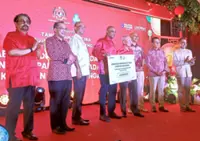SINCE 2014, national sewerage company Indah Water Konsortium (IWK) Sdn Bhd has been entrusted to develop and maintain modern and efficient sewerage systems for the people.
IWK is responsible for ensuring that wastewater is treated before it is released back into water bodies such as drain, rivers or the sea.
Without going through the treatment process, untreated sewage can contaminate water sources and the environment – harming public health and the country’s economic growth.
There are two main types of sewerage systems in Malaysia – connected sewerage systems and traditional sewerage systems.
In connected sewerage systems, the sewage is channelled from premises to treatment facilities, whereas traditional sewerage systems have septic tanks and pour-flush toilets.
Connected sewerage service customers have sewage outlets that are directly linked to a sewage treatment plant via an underground network of sewer pipes.
Today, IWK maintains an underground sewage pipe network of approximately 20,614 km throughout Peninsular Malaysia.
The company is responsible for the operation and maintenance of 7,411 public sewage treatment plants.
For traditional sewage systems, there are several types of septic tanks that are still in use, such as individual, pour-flush and communal septic tanks. A septic tank is a non-connected sewage system located within premises to temporarily store sewage and sludge.
Sludge that enters the septic tank will settle at the bottom, allowing for clean water to flow out near the top of the tank, towards the drainage systems.
The sludge undergoes a natural and biological process which will gradually fill up the tank. The septic tanks need to be desludged (emptied) periodically – at least once every two years – subject to the capacity of the tank and the household.
It is important to desludge septic tanks to prevent accumulated sludge from becoming full and hard, resulting in incoming sewage to flow right to the top and out into drains and waterways. This can harm the environment, as well as cause back flow within premises.
It is also vital for users to ensure that the contractor selected to perform the task of emptying the septic tank will dispose the sludge in an orderly manner.

IWK customers can be assured that the sludge that is collected from their septic tanks will go through a proper, efficient and safe treatment process – ensuring that the sewage does not contaminate water resources and the environment.
When treating sewage, there are important processes to ensure that the treated sewage is safe to be released into waterways.
When the sewage enters the IWK sewage treatment plant, it will start with a pre-treatment process whereby rubbish and large solids, such as sand and oils, are removed.
This pre-treatment process is to ensure that the wastewater conditions are suitable for further processing.
This is followed by a primer treatment – an extension of the pre-treatment process – whereby fine stones and sand that cannot be removed mechanically will be separated through a sedimentation method.
The further removal of oil and grease also takes place during this process. Upon completion, the wastewater will go through a secondary treatment process, whereby it will enter an aeration tank with fine air bubbles introduced into the mix via the submerged diffuser.
The solids from the sewage will then be in a suspended state, allowing bacteria in the sewage to break down organic materials. This aeration process takes 18 to 24 hours.
The final sedimentation process takes place in a clarifier tank, where the leftover solids from the aeration process will be allowed to settle to the bottom of the tank and subsequently be taken to the sludge dewatering machine.
The light sludge that floats will be collected for re-treatments and drying before it can be sent to a landfill or for processing into fertiliser and soil conditioners. The sewage that has been treated, also known as effluent, is then safe to be channelled back into bodies of water.
IWK takes wastewater treatment very seriously by ensuring that the wastewater is treated safely, based on the highest standards of effluent discharge quality, as it plays an important role in protecting the environment from potential harm.
IWK treats more than 6.8 million cubic metres of wastewater per day – equivalent to 2,800 Olympic-sized swimming pools – produced by a population equivalent (EP) of 30 million people.
This responsibility cannot be borne by IWK alone, without support from all Malaysians. This is why the company implores Malaysians to be responsible consumers and citizens by not disposing of objects, oil and garbage down pipelines of premises, especially down the toilet.
For more information, visit https://iwk.com.my/.





